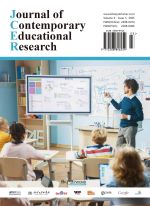A New Interpretation of “Unity of Knowledge and Action”: A Theoretical Model of Integrating Traditional Cultural Ecological Wisdom into STEAM Education
Abstract
This study constructs a theoretical model integrating traditional cultural ecological wisdom into STEAM education, exploring a new interpretation of the “unity of knowledge and action” concept in modern education. Research shows that incorporating traditional ecological wisdom, such as the harmony between humanity and nature and following the laws of nature, into STEAM education’s curriculum, teaching methods, and practical activities can significantly enhance students’ interdisciplinary knowledge, practical abilities, and environmental awareness. Through data simulation and empirical analysis, the model’s effectiveness is confirmed, demonstrating its significant advantages in improving students’ overall quality and cultivating talents with global perspectives and local sentiments. Innovatively, this study bridges traditional cultural ecological wisdom and STEAM education with “unity of knowledge and action,” offering new insights for educational reform.
References
Wansudon S, Inthama P, Unyapoti T, et al., 2023, Local Wisdom Board Game Based on the Concept of STEAM Education to Promote Innovator Skills. ACEID Official Conference Proceedings, 447–456.
Wang Z, Jiang Q, Jiao Y, 2019, Traditional Ecological Wisdom in Modern Society: Perspectives from Terraced Fields in Honghe and Chongqing, Southwest China, in Li S, (Ed.), Environmental Change and Adaptation, 8–17.
Wang H, 2020, Core Objectives and High-Quality Implementation Models of Preschool STEAM Education. Early Childhood Education Research Quarterly, 32(1): 5–10.
Su H, Huang R, 2022, STEAM Education in China: Development, Challenges, and Opportunities. Journal of Educational Technology & Society, 25(1): 123–135.
Chen Y, Li H, 2023, Integrating Traditional Cultural Ecological Wisdom into STEAM Education: A Case Study of Environmental Protection Projects in Primary Schools. Journal of Environmental Education, 54(2): 121–132.

